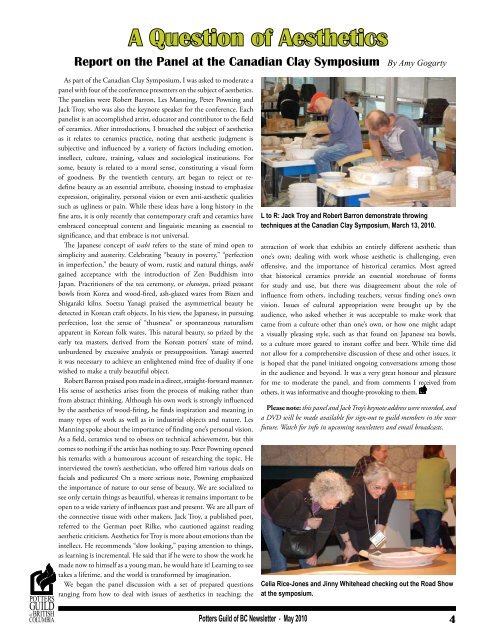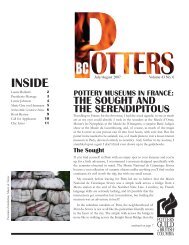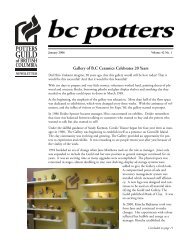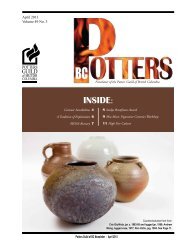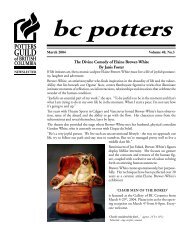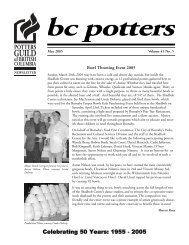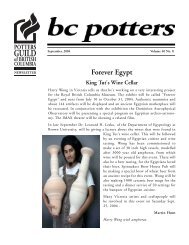May - Potters Guild of BC
May - Potters Guild of BC
May - Potters Guild of BC
Create successful ePaper yourself
Turn your PDF publications into a flip-book with our unique Google optimized e-Paper software.
POTTERS<br />
GUILD<br />
<strong>of</strong> BRITISH<br />
COLUMBIA<br />
A Question <strong>of</strong> Aesthetics<br />
Report on the Panel at the Canadian Clay Symposium By Amy Gogarty<br />
As part <strong>of</strong> the Canadian Clay Symposium, I was asked to moderate a<br />
panel with four <strong>of</strong> the conference presenters on the subject <strong>of</strong> aesthetics.<br />
The panelists were Robert Barron, Les Manning, Peter Powning and<br />
Jack Troy, who was also the keynote speaker for the conference. Each<br />
panelist is an accomplished artist, educator and contributor to the field<br />
<strong>of</strong> ceramics. After introductions, I broached the subject <strong>of</strong> aesthetics<br />
as it relates to ceramics practice, noting that aesthetic judgment is<br />
subjective and influenced by a variety <strong>of</strong> factors including emotion,<br />
intellect, culture, training, values and sociological institutions. For<br />
some, beauty is related to a moral sense, constituting a visual form<br />
<strong>of</strong> goodness. By the twentieth century, art began to reject or redefine<br />
beauty as an essential attribute, choosing instead to emphasize<br />
expression, originality, personal vision or even anti-aesthetic qualities<br />
such as ugliness or pain. While these ideas have a long history in the<br />
fine arts, it is only recently that contemporary craft and ceramics have<br />
embraced conceptual content and linguistic meaning as essential to<br />
significance, and that embrace is not universal.<br />
The Japanese concept <strong>of</strong> wabi refers to the state <strong>of</strong> mind open to<br />
simplicity and austerity. Celebrating “beauty in poverty,” “perfection<br />
in imperfection,” the beauty <strong>of</strong> worn, rustic and natural things, wabi<br />
gained acceptance with the introduction <strong>of</strong> Zen Buddhism into<br />
Japan. Practitioners <strong>of</strong> the tea ceremony, or chanoyu, prized peasant<br />
bowls from Korea and wood-fired, ash-glazed wares from Bizen and<br />
Shigaraki kilns. Soetsu Yanagi praised the asymmetrical beauty he<br />
detected in Korean craft objects. In his view, the Japanese, in pursuing<br />
perfection, lost the sense <strong>of</strong> “thusness” or spontaneous naturalism<br />
apparent in Korean folk wares. This natural beauty, so prized by the<br />
early tea masters, derived from the Korean potters’ state <strong>of</strong> mind,<br />
unburdened by excessive analysis or presupposition. Yanagi asserted<br />
it was necessary to achieve an enlightened mind free <strong>of</strong> duality if one<br />
wished to make a truly beautiful object.<br />
Robert Barron praised pots made in a direct, straight-forward manner.<br />
His sense <strong>of</strong> aesthetics arises from the process <strong>of</strong> making rather than<br />
from abstract thinking. Although his own work is strongly influenced<br />
by the aesthetics <strong>of</strong> wood-firing, he finds inspiration and meaning in<br />
many types <strong>of</strong> work as well as in industrial objects and nature. Les<br />
Manning spoke about the importance <strong>of</strong> finding one’s personal vision.<br />
As a field, ceramics tend to obsess on technical achievement, but this<br />
comes to nothing if the artist has nothing to say. Peter Powning opened<br />
his remarks with a humourous account <strong>of</strong> researching the topic. He<br />
interviewed the town’s aesthetician, who <strong>of</strong>fered him various deals on<br />
facials and pedicures! On a more serious note, Powning emphasized<br />
the importance <strong>of</strong> nature to our sense <strong>of</strong> beauty. We are socialized to<br />
see only certain things as beautiful, whereas it remains important to be<br />
open to a wide variety <strong>of</strong> influences past and present. We are all part <strong>of</strong><br />
the connective tissue with other makers. Jack Troy, a published poet,<br />
referred to the German poet Rilke, who cautioned against reading<br />
aesthetic criticism. Aesthetics for Troy is more about emotions than the<br />
intellect. He recommends “slow looking,” paying attention to things,<br />
as learning is incremental. He said that if he were to show the work he<br />
made now to himself as a young man, he would hate it! Learning to see<br />
takes a lifetime, and the world is transformed by imagination.<br />
We began the panel discussion with a set <strong>of</strong> prepared questions<br />
ranging from how to deal with issues <strong>of</strong> aesthetics in teaching; the<br />
<strong>Potters</strong> <strong>Guild</strong> <strong>of</strong> <strong>BC</strong> Newsletter . <strong>May</strong> 2010<br />
L to R: Jack Troy and Robert Barron demonstrate throwing<br />
techniques at the Canadian Clay Symposium, March 13, 2010.<br />
attraction <strong>of</strong> work that exhibits an entirely different aesthetic than<br />
one’s own; dealing with work whose aesthetic is challenging, even<br />
<strong>of</strong>fensive, and the importance <strong>of</strong> historical ceramics. Most agreed<br />
that historical ceramics provide an essential storehouse <strong>of</strong> forms<br />
for study and use, but there was disagreement about the role <strong>of</strong><br />
influence from others, including teachers, versus finding one’s own<br />
vision. Issues <strong>of</strong> cultural appropriation were brought up by the<br />
audience, who asked whether it was acceptable to make work that<br />
came from a culture other than one’s own, or how one might adapt<br />
a visually pleasing style, such as that found on Japanese tea bowls,<br />
to a culture more geared to instant c<strong>of</strong>fee and beer. While time did<br />
not allow for a comprehensive discussion <strong>of</strong> these and other issues, it<br />
is hoped that the panel initiated ongoing conversations among those<br />
in the audience and beyond. It was a very great honour and pleasure<br />
for me to moderate the panel, and from comments I received from<br />
others, it was informative and thought-provoking to them.<br />
Please note: this panel and Jack Troy’s keynote address were recorded, and<br />
a DVD will be made available for sign-out to guild members in the near<br />
future. Watch for info in upcoming newsletters and email broadcasts.<br />
Celia Rice-Jones and Jinny Whitehead checking out the Road Show<br />
at the symposium.<br />
4


